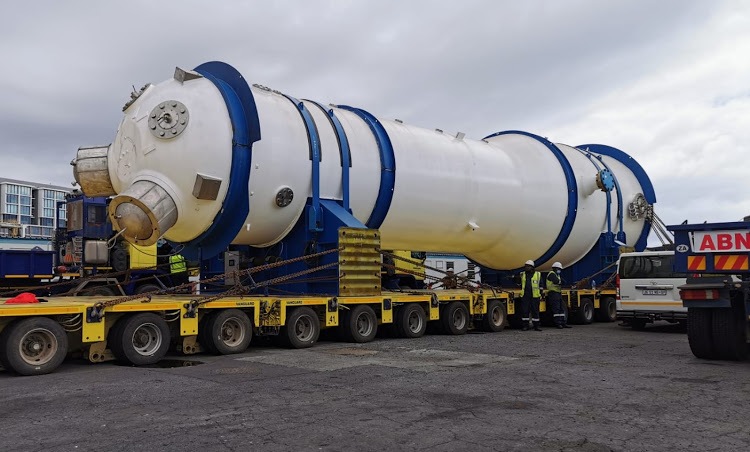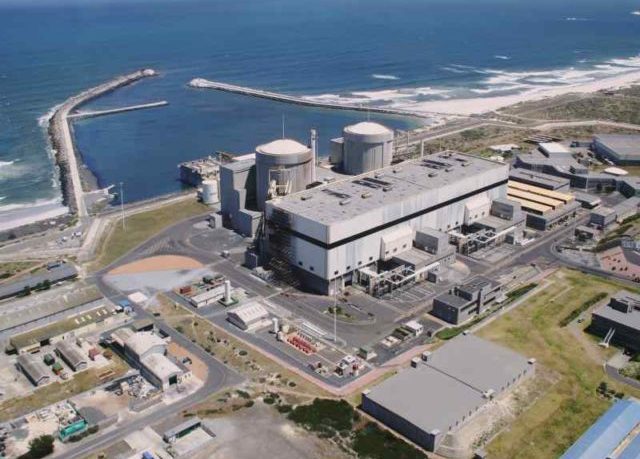- South Africa’s state owned and state run energy utility, Eskom, reports that the mechanical work of the replacement of the steam generator at Unit 1 of the Koeberg Nuclear Power Station was completed at the end of July.
- Given all the outstanding activities, Koeberg Unit 1 is planned to be commercially available on 3 November 2023 they say.
- The utility is busy with a highly controversial R20 billion life extension programme of the 39 year plant which has been plagued with delays, penalties and cost overruns. Read more
- Eskom itself currently has unsustainable debt of over R439 billion. Read more
- Construction of the power station began in 1976, and Unit 1 was synchronized to the grid on 4 April 1984.
- Unit 2 followed on 25 July 1985.
“This is the most significant part of the scope which involved complex activities and it means that Eskom is now proceeding with the outage activities that could not be performed in parallel with the replacement of the steam generators. Immediately after the completion of the outage activities, the reactor will be reloaded with fuel, enabling the return to service of the unit. The commissioning, including the necessary tests of the new steam generators, will take place while the unit is synchronised to the grid,” reports Eskom.
“Given all the outstanding activities, Koeberg Unit 1 is planned to be commercially available on 3 November 2023,” said Eskom in a statement.
Due to the deferment of the return of Unit 1, the outage of Unit 2 has been postponed to 7 November 2023 to ensure that there is no simultaneous shutdown of both Koeberg units and can confirm that resources are ready to start with the first activities of Unit 2 outage.
The replacement of the steam generators was a first of its kind complex nuclear project to be performed at Koeberg and is the last major plant component out of the three to be replaced on the unit as part of the Long-Term Operation (LTO) project. The other two components, namely the replacement of the Refuelling Water Storage Tanks and the Reactor Vessel Closure Heads, have been replaced in previous years on both Units 1 and 2. The replacement of the steam generators is the last of the large components that Eskom deemed necessary to be replaced in support of its application to operate the Koeberg units for another 20 years.

In October 2020, one of six new 380-ton steam generators arrives at Koeberg nuclear power station in Cape Town for the plants life extension programme. Image
credit: Eskom
The new steam generators are more efficient and will produce an additional 27MW while enabling Koeberg to continue generating electricity for years.
The conservative design of the station, the investment that Eskom has made in continuously improving the safety standards, the rigorous maintenance as well as the testing programme over its operating lifespan, give merit to Eskom’s decision to apply for the licence to operate the plant for an additional 20 years. The Koeberg units have operated safely and reliably for almost 40 years. The amendment of the operating licence will enable Koeberg to continue providing safe, clean, and reliable power to the grid, and playing the essential role of stabilising supply in the Western Cape, which Unit 2 has safely continued to do with an excellent energy availability factor of 94.87%, while Unit 1 was on outage.
Eskom would like to assure all stakeholders that the deferment of the Unit 1 outage does not negatively impact the licence application with the National Nuclear Regulator (NNR) to amend the Koeberg operating licence. Furthermore, as part of a continual improvement process, Eskom is analysing the causes of the delays on Unit 1 to ensure that they are not repeated during the upcoming steam generator replacement on Unit 2.
Author: Bryan Groenendaal
Source: Eskom















